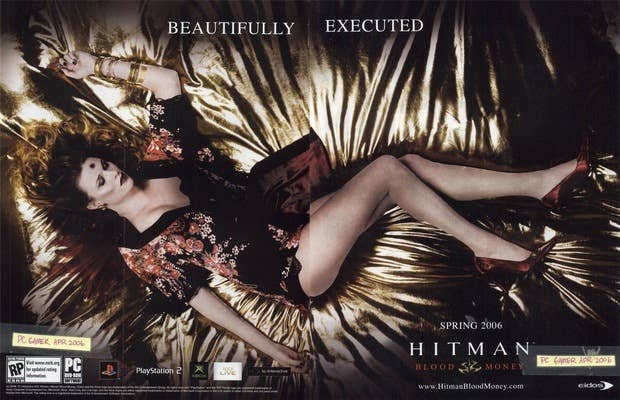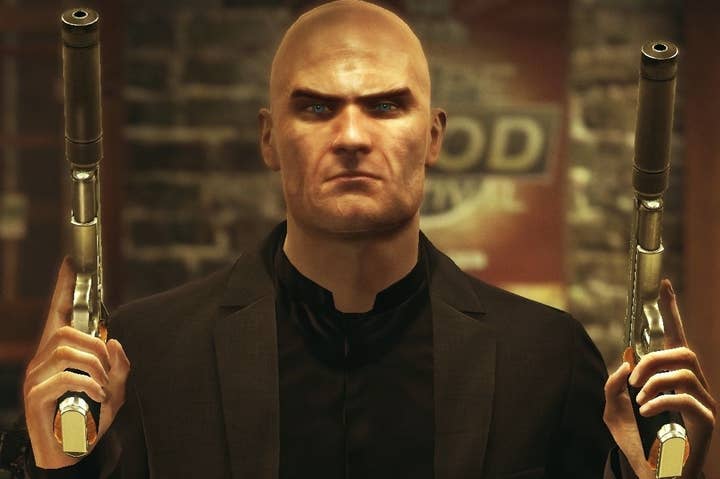Hitman Marketing Botches the Job, Sells Us Short
Just what was Square Enix trying to accomplish with its bully-friendly Facebook app?
Earlier today, Square Enix launched a new Facebook app for Hitman: Absolution that lets users put out a virtual hit on their friends. Users would then tell Agent 47 how to identify the target from a dropdown menu that included traits ripe for bullying (bad odor, "small tits," small penis), and give him a reason why.
The app was quickly pulled, and Square Enix apologized, saying, “We were wide of the mark with the app, and following feedback from the community we decided the best thing to do was remove it completely and quickly. This we've now done. We're sorry for any offense caused by this.”
“Wide of the mark” is a charitably understated description of how culturally tone deaf the app was. It doesn't take a particularly enlightened person to realize that online bullying is an issue. All it takes is an understanding that the Internet can bring out the worst in people, and the barest shred of empathy for people enduring the hardships of growing up. And if somehow people don't come by those traits naturally, there are plenty of heart-breaking stories in the news about it. (Here's a recent one. And another. One more. And don't forget this one. We could go on.)
"Square Enix decided it was acceptable to not only condone but actually enable online bullying because it might sell more copies of their game."
Let's assume the marketing teams at Square Enix and Ralph (the advertising agency that made the app) understand what it is they do for a living and had some notion this app would cause a stir, helping the recently released game stand out in gaming circles among the talk of Halo 4, Black Ops II, Assassin's Creed III, the Wii U, and now Far Cry 3. Knowing that, they weighed the benefits of increased awareness versus the potential downsides of offending the masses and losing control of the public narrative surrounding the game. Ultimately, they chose that the potential rewards outweighed the risks. They decided it was acceptable to not only condone but actually enable online bullying because it might sell more copies of their game.
The app was offensive and insensitive, an indefensible mistake deserving of many more colorful and harsh words. That's not the headline here; we should all agree on at least that much. But as disturbing as the Hitman app was on the surface, it carries an implication that is similarly unsettling when considered it in context of the game's overall marketing plan.
In a talk at the Montreal International Games Summit last month, Square Enix director of marketing Cord Smith detailed the evolution of the game's marketing plan. Smith said that from the beginning, Hitman: Absolution was developed and marketed as the game that would take the franchise beyond its existing fanbase. It was “The Hitman that was meant to go to the masses,” a designation that created tension with the fanbase early on.
After the team showed off the game with the Run For Your Life level in 2011, Smith said the hardcore fans were deeply critical. They said it looked terrible, proclaiming that IO Interactive and Square Enix had turned the series into a straight-forward action game for a more casual crowd. Winning that hardcore crowd back over then became a priority, something Smith said was achieved by releasing other videos highlighting the different ways players could approach each level.
Of course, the most notorious part of the game's marketing campaign was still to come. Earlier this year, the “Attack of the Saints” trailer drew flack for its celebration of Agent 47's brutal dismantling of a group of female mercenaries dressed in suggestive latex nun outfits. In an interview with GamesIndustry International after his MIGS presentation, Smith said he was surprised by the reaction that trailer received, and that it was never intended to shock.
"After the team showed off the game...in 2011, Smith said the hardcore fans were deeply critical."
"In general, you'd imagine any controversy provides increased awareness of the game's existence," Smith said. "So if you're just looking from an awareness standpoint, maybe it's helpful in spite of the tone of some of the comments and debates that went on. But I don't think it was something we would want to exploit, that sort of awareness.”
While that comment might be particularly relevant now, it was actually another part of the same discussion I found myself reconsidering after today's marketing stunt, comments he made about the Hitman community's reaction to the Attack of the Saints outcry.
“I was really impressed with how the fans rose up to represent the franchise,” Smith told me. “Not necessarily to represent the company, and not necessarily to shut people down in terms of a smart, intelligent debate about how we craft, create, or design female characters in games, or is violence against women something we need to take seriously… But within the fiction and the universe of Hitman, these were guys who'd been there and knew the tongue-in-cheek nature of it.”
Putting aside the notion of “Is violence against women something we need to take seriously” being a question up for intelligent debate, anyone who reads the comments on gaming sites' Attack of the Saints editorials knows what Smith is referring to. While Smith might not have seen the response as looking to shut down intelligent discourse, it was clear that when the brand was threatened, its fans flocked to its side with defensive hostility and eye-rolling dismissiveness.

To recap, Square Enix believed Hitman fans were turned off by the idea that their series changing in an effort to make it approachable for to the masses. Next, it released the Attack of the Saints trailer, embracing all the exclusionary and misogynistic stereotypes the masses believe about the game industry. When observers beyond the series' core audience complained, the fans came rallying to Hitman's defense. After all, the people complaining were the same people for whom Square Enix was gutting the brand, the casuals who would cause it to be turned into just another Gears of War or Call of Duty. Any furor over the nun trailer thus engaged fans of the series and got them further invested in Absolution. Then the game launched, and Square Enix released a Facebook app not just appealing to exclusionary and misogynistic stereotypes, but actually facilitating and encouraging exclusionary and misogynistic behavior. Now we get a flood of critiques from the press, and in turn, more caustic defensiveness from a reinvigorated and re-engaged fanbase.
This whole sad stunt speaks to what little regard Square Enix has for the victims of bullying, and to the publisher's paucity of conscience. But that's obvious, and it's an idea that will be heard from a lot of people today. Slightly less obvious (but no less insulting) is what it says about how Square Enix perceives the gamers who make up its customer base, that they condone misogyny, that they are as narrow of mind as they are mean of spirit, that they can be made to buy games out of spite for people who would be offended or disapprove of their game.
That dim evaluation of the target market's tastes is certainly in keeping with the franchise's previous marketing. In October, GameStop ran a Hitman contest promising to give gamers “a shot at living the extravagant life of a professional hitman,” because apparently killing people for money is something cool and a fantasy that gamers should aspire to. Long before that, the series sparked another debate about sex and violence in games with a 2006 ad for Hitman: Blood Money, which showed a women lying prone in a revealing gown with a bullet hole in her forehead and the tagline “Beautifully Executed” above her corpse.
And for those of us in the media who have been manipulated into talking about this, into increasing awareness of a product for the dumbest of reasons, we must take some small solace in the knowledge that the Square Enix marketers are in the wrong, even if their fans prove them right.

